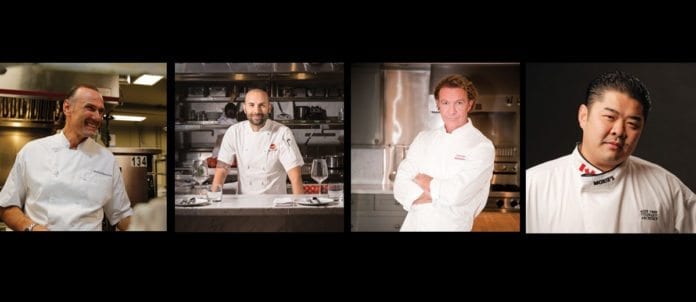ON TRENDS
Michael Bonacini: Trying to predict trends is not easy. It’s more about social cues and what’s going on globally. It’s always a moving target.
Mark McEwan: I’m doing a lot of Middle Eastern cuisine right now — African, South East Asia — everyone’s in love with that part of the world because it tends to be a low fat, healthier diet.
Alex Chen: Two major trends I’m seeing in Vancouver are Korean and Latin cuisine from tacos and burritos to Peruvian ceviche. And you can’t forget Raman — it’s everywhere.
ON INNOVATION
MB: If you don’t keep reinventing yourself, you’ll go the way of the DoDo bird. That doesn’t mean you take the concept of your restaurant in a completely different direction; just keep current and exciting — from interior design, to uniforms, to menu content and new drinks. If you don’t do that, you’ll become yesterday’s lunch.
AC: As a restaurant, we encourage and collaborate with sous chefs in our kitchens to come up with new dishes and that’s what drives us. We also take advantage of new technology to help us create more innovative food that still stays true to the origin of the dish.
MM: [Innovation is] quite organic, in terms of understanding clients. [Operators] need to recognize the demographic of the area and who their customers are, then model their restaurants to fit the needs of those customers. [Innovation] is about fitting into their lives.
Rob Gentile: Innovation is an ongoing thing that is constantly kept up and for us, it starts with our staff. They have to be injected with creativity and excitement — so it’s about pushing them out of their comfort zone and getting them excited about different things.
ON THE TIPPING MODELS
RG: We’ve been pooling [tips] since day one, so our staff share in everything that is brought in. For us, it’s a way of saying ‘if you’re going to work here, you’re going to work as a team’ and it doesn’t matter if you’re polishing glasses in the back or waiting tables — they’re all there together to provide the experience for the guest. For us it’s been successful so far. The problem with abolishing tips is it leaves a large gap that operators need to fill — how do you tell a customer that 20 per cent is going to be added to their bill when maybe they don’t want to tip that much?
MM: I don’t believe [abolishing tips] works — it causes chaos and unhappiness. There is a basic nature that servers have — they work a table, take care of people all night long, they believe they have ownership of the table and you have to respect that. I’ve never interfered with a server’s tips, I’ve never taken a penny from them. Our concept is that we’ll keep the current system in place but a larger percentage of the tips will go to the cooks.
ON BECOMING A CHEF
MM: I applied to Annapolis and was refused — I wanted to be a fighter pilot but didn’t have the math grades. My first restaurant job was at 16 years old and really enjoyed the environment.
AC: I grew up in large family in Malaysia and food was always around. We greeted each other with ‘have you eaten?’ not ‘how are you?’ I started in restaurants because when I applied for jobs growing up, they were the only ones to call me back.
MB: My parents were both in the hotel/restaurant business and my sister is a chef as well. My brother makes dog food for dogs with digestive problems. Restaurants are in my DNA, although I spend very little time in the kitchen these days — my focus is on menu direction and the business side.
RG: I was raised in an Italian family and food was everything. When I was 13, I asked my mother what I should do [as a job] and she said ‘whatever you do, make sure you truly love it because it’s what you’ll be doing for the rest of your life.’ Within five minutes, I knew it would be something with food.
Volume 49, Number 5


















